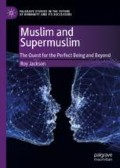Abstract
Ziauddin Sardar has argued that science is not value-free and looks to the Muslim world for an ‘indigenous science’ that reflects Islamic values. This ‘Islamization’ of knowledge has its origins with the Traditionalist, or Perennialist, school of thought with René Guénon (1866–1951) and Frithjof Schuon (1907–1998), and then passed on to the mighty figure of Hossein Nasr (b. 1933), who champions a totalising of all knowledge under the umbrella of Islam. That is, science, history, anthropology, philosophy, and so on are all to be found—and sought—in divine revelation, as this constitutes perennial truth. Therefore, the claims of modernity, which would include evolutionary theory, are to be disputed if they are not part of this perennial truth. The Islamic scholar of science and religion Stefano Bigliardi, who has devoted a number of years examining the debates on Islam and science, claims that we can now talk of a ‘new generation’ of scientific thinkers.
Access this chapter
Tax calculation will be finalised at checkout
Purchases are for personal use only
Notes
- 1.
It is worth pointing out that, whilst Ibn Taymiyyah is often cited in the modern era, he was perhaps something of a minority figure during his own time and for quite some centuries after (see Rapoport and Ahmed 2010, Introduction p. 6). All the more reason to not give the relatively recent prescriptive approach to Islam as much attention as it seems to get.
- 2.
Note: All quotes from the Qur’an are from the translation by M.A.S. Abdel Haleem, Oxford University Press, 2005.
Bibliography
Note: All quotes from the Qur’an are from the translation by M.A.S. Abdel Haleem, Oxford University Press, 2005.
Books
de Bellaigue, Christopher. 2017. The Islamic Enlightenment: The Modern Struggle Between Faith and Reason. London: Bodley Head.
Bigliardi, Stefano. 2014. Islam and the Quest for Modern Science: Conversations with Adnan Oktar, Mehdi Golshani, Mohammed Basil Altaie, Zaghloul El Naggar, Bruno Guiderdoni and Nidhal Guessoum. Istanbul: Swedish Research Institute in Istanbul.
Bucaille, Maurice. 2003. The Bible, the Qu’ran and Science: The Holy Scriptures Examined in the Light of Modern Knowledge. Scotts Valley, CA: CreateSpace Independent Publishing Platform.
Dupré, Louis. 2005. The Enlightenment and the Intellectual Foundations of Modern Culture. New Haven, CT: Yale University Press.
El-Naggar, Zaghlul. 2012. Treasures in the Sunnah: A Scientific Approach: Part Two. Rochdale, UK: Scribe Digital.
Frankl, Viktor E. 1987. El Hombre Doliente, Fundamentos Antropológicos de la Psicoterapia. Barcelona: Herder Editorial.
Kant, Immanuel. 1998. Critique of Pure Reason. Cambridge: Cambridge University Press.
Mawdudi, Abu Al’a. 1985. Islam Today. Beirut: International Islamic Federation of Student Organisations.
———. 1995. Jihad fi Sabillah: Jihad in Islam. Translated and Edited by Khurshid Ahmad. Birmingham: Huda Khattab, UK Islamic Mission Dawah Centre.
Mawdudi, Mawlana. 1963. A Short History of the Revivalist Movement in Islam. Lahore: Islamic Publications.
Nasr, Hossein, and Muzaffar Iqbal. 2009. Islam, Science, Muslims and Technology. Islamabad: Dost Publication.
Rapoport, Yossef, and Shahab Ahmed, eds. 2010. Ibn Taymiyya and His Times. Oxford: Oxford University Press.
Ruthven, Malise. 2000. Islam in the World. 2nd ed. London: Penguin.
Sagan, Carl. 1997. Pale Blue Dot: A Vision of the Human Future in Space. New York: Ballantine Books.
Sardar, Ziauddin. 1989. Explorations in Islamic Science. London: Mansell Publishing Limited.
Smith, Wilfred Cantwell. 1957. Islam in Modern History. Princeton: Princeton University Press.
Yaqubi, Ahmad ibn Abi Yaqub. 1892. Kitab al-Buldan (Book of Lands). Edited by M.D. Goeje. Leiden: Leiden University Press.
Journal Articles and Book Chapters
Ahmad, Khurshid. 1983. The Nature of Islamic Resurgence. In Voices of Resurgent Islam, ed. John L. Esposito, 218–229. Oxford: Oxford University Press.
Frankl, Viktor. 1967. Logotherapy and Existentialism. Psychotherapy: Theory, Research and Practice 4 (3): 138–142.
Guessoum, Nidhal. 2015. Reviews on Religion and Science around the World. Zygon 50 (4): 854–876.
Hańderek, Joanna. 2007. The Positionalist Notion of Human Nature in Plessner’s and Gehlen’s Philosophy. Analecta Husserliana XCIV: 533–547.
Kiyimba, Abasi. 2007. Islam and Science: An Overview. In Islamic Perspective on Science, ed. Ali Ünal, 1–27. Clifton, NJ: The Light Inc.
Lehmann, Olga V., and Sven Hroar Klempe. 2015. Psychology and the Notion of the Spirit: Implications of Max Scheler’s Anthropological Philosophy in Theory of Psychology. Integrative Psychological and Behavioral Science 49 (3): 478–484. Springer.
Liccioli, Stefano. 2008. Il problema dell’uomo nel pensiero di Max Scheler. Humana Mente 2 (7): 79–104.
Musa, Aisha Y. 2009. A Thousand Years, Less Fifty: Toward a Quranic View of Extreme Longevity. In Religion and the Implications of Radical Life Extension, ed. Derek F. Mhaer and Calvin Mercer, 123–131. New York: Palgrave Macmillan.
Nasr, Hossein. 2006. On the Question of Biological Origins. Islam & Science 4 (2): 181–197.
Sardar, Ziauddin. 1985. Between Two Masters: Qur’an or Science? Inquiry: An Interdisciplinary Journal of Philosophy 2 (8): 37–41.
———. 1986. Redirecting Science towards Islam: An Examination of Islamic and Western Approaches to Knowledge and Values. Hamdard Islamicus 9 (1): 23–34.
———. 2006. Ziauddin Sardar Confronts the Commentators. New Statesman, February 6.
Scheler, Max. 2004. Das Ressentiment im Aufbau der Moralen. Frankfurt am Main: Klostermann Seminar.
Author information
Authors and Affiliations
Corresponding author
Rights and permissions
Copyright information
© 2020 The Author(s)
About this chapter
Cite this chapter
Jackson, R. (2020). The Perennial Human and Beyond. In: Muslim and Supermuslim. Palgrave Studies in the Future of Humanity and its Successors. Palgrave Macmillan, Cham. https://doi.org/10.1007/978-3-030-37093-0_5
Download citation
DOI: https://doi.org/10.1007/978-3-030-37093-0_5
Published:
Publisher Name: Palgrave Macmillan, Cham
Print ISBN: 978-3-030-37092-3
Online ISBN: 978-3-030-37093-0
eBook Packages: Religion and PhilosophyPhilosophy and Religion (R0)

